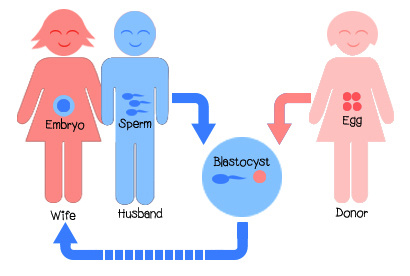When are donated oocytes used in reproductolgy?
Exploring the Transformative Journey of Using Donor Eggs in Assisted Reproductive Technologies.
In cases where other available treatments do not show effectiveness, egg donation is a solution.
Their use allows a woman to become pregnant and give birth to a child.
There are a number of diseases that are an indicator for the use of donor eggs. This is premature exhaustion of the ovaries, a decrease in the ovarian reserve, genetic diseases, the presence of unsuccessful attempts at in vitro fertilization (IVF) and if the woman is over 40 years old.
To participate in an egg donation program, egg donor undergoes a screening and provides information on medical history.
After a thorough examination, the donor receives hormones for superovulation.
The eggs will then be retrieved and fertilized with the husband’s or donor’s sperm.
The resulting embryo is transferred in a few days to the patient’s uterus, which has been prepared by hormone therapy.
IVF clinics often vitrify donors’ eggs for later use.
For couples facing infertility challenges, the use of egg donation has emerged as a transformative option within the realm of assisted reproductive technologies (ART). This innovative approach offers renewed hope and an alternative path to parenthood. It provides a unique solution for those struggling with issues related to egg quality, diminished ovarian reserve, or genetic concerns.
Understanding egg donation:
Egg donation, often provided by anonymous or known egg donors, serve as a crucial element in the assisted reproductive process. This method involves fertilizing the donated eggs with sperm, either from the intended father or a sperm donor, to create embryos. These embryos are then transferred to the uterus of the intended mother or a gestational surrogate.
Who Chooses to Use Egg Donation:
Women with Diminished Ovarian Reserve:
As women age, the quantity and quality of their eggs decline. Women facing premature ovarian aging or those who have undergone premature menopause may opt for donor eggs to increase the chances of a successful pregnancy.
Recurrent IVF Failures:
Couples who have experienced repeated unsuccessful in vitro fertilization (IVF) attempts due to poor egg quality may turn to donated eggs as a viable solution.
Genetic Concerns:
Individuals or couples with a high risk of passing on genetic disorders may choose egg donation to avoid transmitting such conditions to their offspring.
Single Women and Same-Sex Couples:
Single women and same-sex couples, particularly those comprised of two women, may opt for donor eggs to facilitate pregnancy.
The Egg Donation Process:
Egg Donor Selection:
The process begins with the selection of a suitable egg donor. This can be an anonymous donor from a fertility clinic or a known donor, such as a friend or family member.
Synchronization of Cycles:
Both the egg donor and the intended mother or gestational surrogate undergo hormonal treatments to synchronize their menstrual cycles.
Egg Retrieval:
The egg donor undergoes ovarian stimulation to produce multiple eggs. Doctor gynecologist retrieves eggs through a minor surgical procedure. Medical professionals carefully monitor this process to ensure the donor’s well-being.
Fertilization:
The retrieved eggs are fertilized with sperm in a laboratory setting, typically using in vitro fertilization (IVF) or intracytoplasmic sperm injection (ICSI) techniques.
Embryo Cultivation:
The fertilized eggs develop into embryos under controlled conditions in the laboratory.
Embryo Transfer:
Once the embryos reach a suitable stage of development, one or more are transferred into the uterus of the intended mother or a gestational surrogate.
Benefits of Using Donor Eggs:
Increased Pregnancy Success Rates:
egg donation significantly enhance the likelihood of a successful pregnancy, especially for women with compromised egg quality.
Genetic Screening Opportunities:
Donated eggs provide an option for preimplantation genetic testing (PGT), allowing for the identification and selection of embryos free from certain genetic disorders.
Expanded Family Building Possibilities:
egg donation open doors to family building for individuals or couples who might otherwise face insurmountable obstacles in conceiving.
Positive Psychological Impact:
Successful pregnancies achieved through donor eggs often lead to positive psychological outcomes, alleviating the emotional toll of infertility.
Challenges and Considerations:
Emotional and Psychological Impact:
While using donor eggs can bring joy and fulfillment, individuals and couples may grapple with complex emotions related to genetic connections and identity.The decision to use donor eggs is often accompanied by a range of emotions for both the intended parents and the egg donor. Intended parents may grapple with feelings of loss or grief related to the genetic connection with the child, while egg donors may experience a mix of altruism and a sense of contribution to the creation of a family.
Counseling and support services are integral components of the process, helping individuals navigate these complex emotions and make informed decisions. Open communication between all parties involved fosters understanding and ensures a supportive environment throughout the journey.
Egg Donor Selection Process:
Choosing a suitable donor is a critical decision. The screening process, including medical and psychological evaluations, helps ensure compatibility and mitigate potential risks.
Disclosure and Family Dynamics:
Deciding when and how to disclose the use of donated eggs to the child, as well as extended family and friends, requires careful consideration.
The use of donor eggs has profound implications for families. It provides a pathway to parenthood for those who may not have had this opportunity otherwise. Children born through egg donation conception often grow up in families where love, support, and communication matter, regardless of the genetic connection.
Furthermore, the experience of utilizing donor eggs can strengthen familial bonds as parents navigate the unique challenges and joys associated with alternative means of conception.
Why Ukrainian Surrogates for Egg Donors?
What is surrogacy and sperm, egg and embryo donation?


